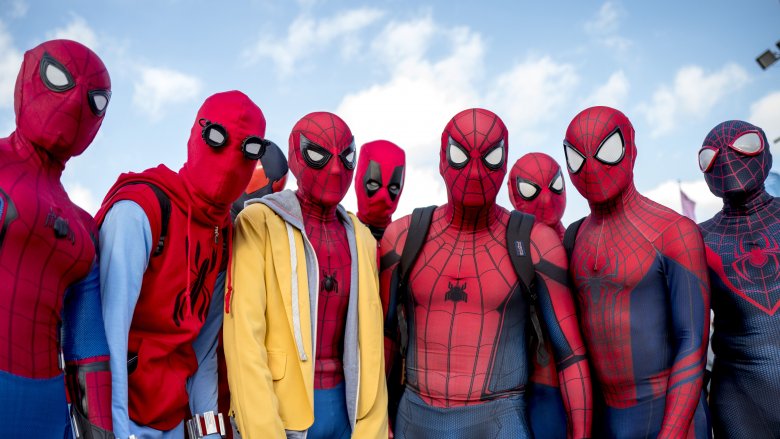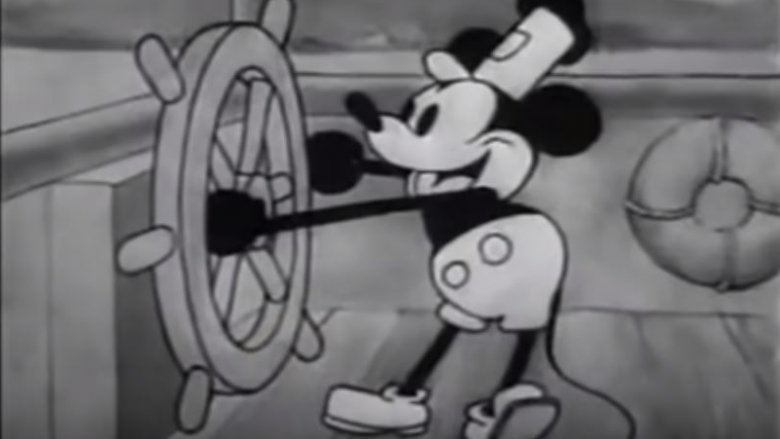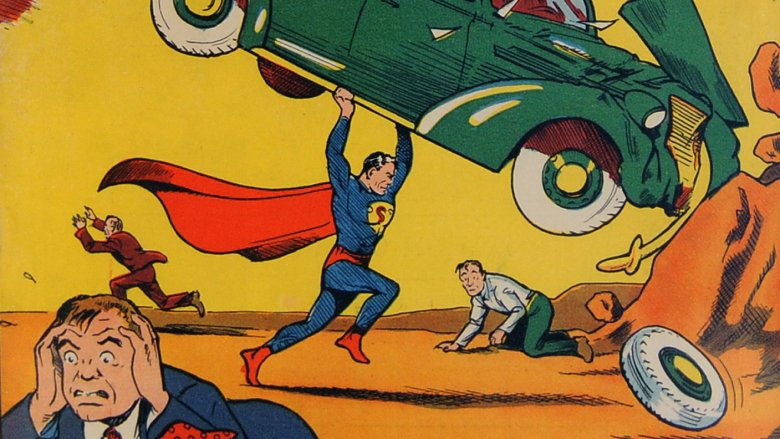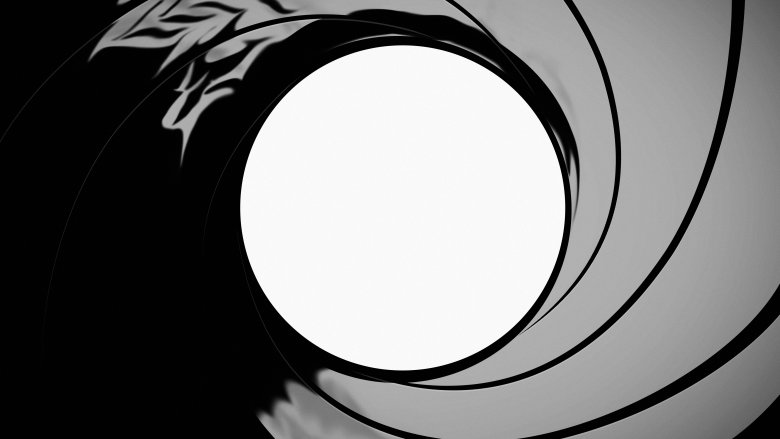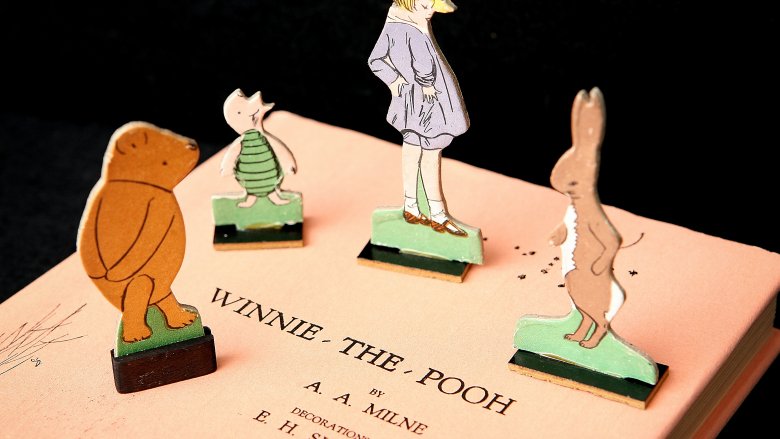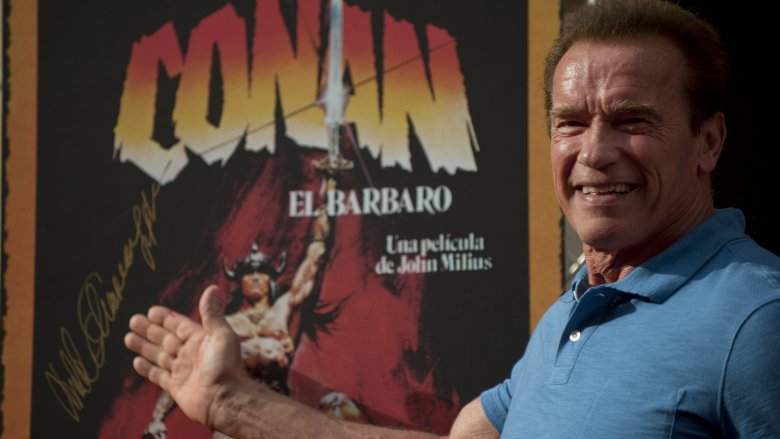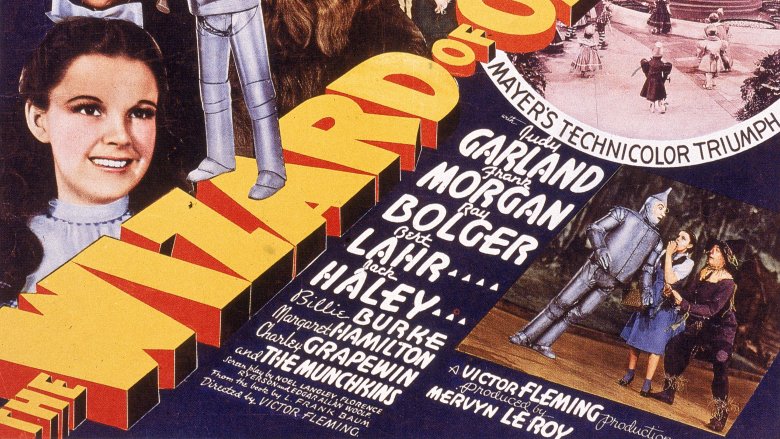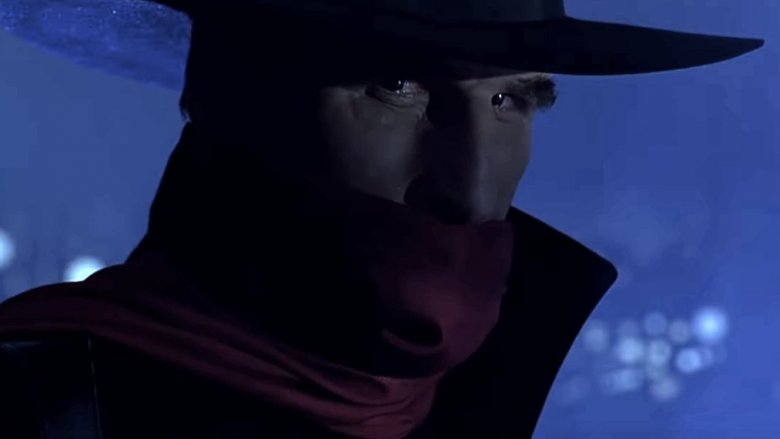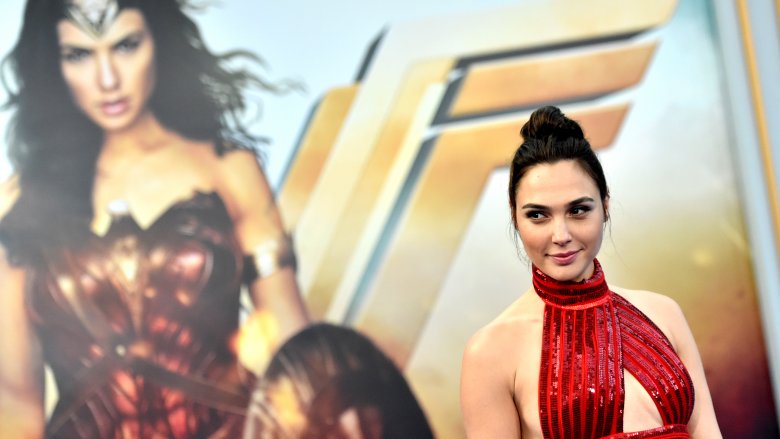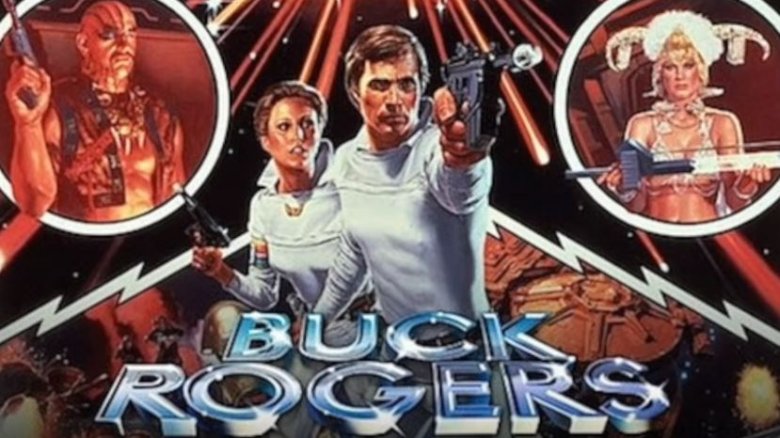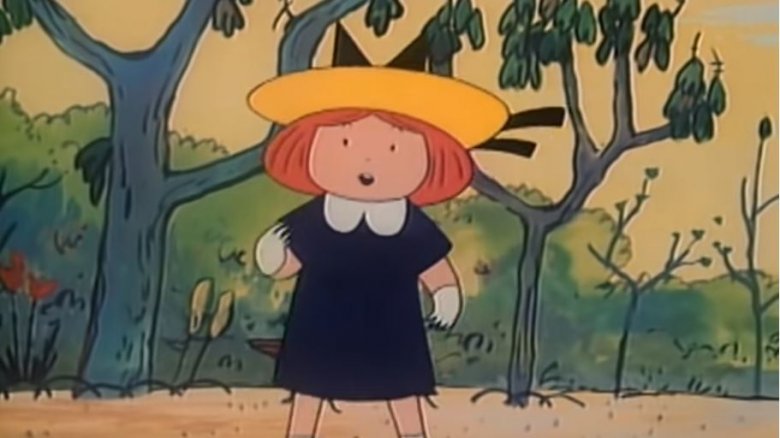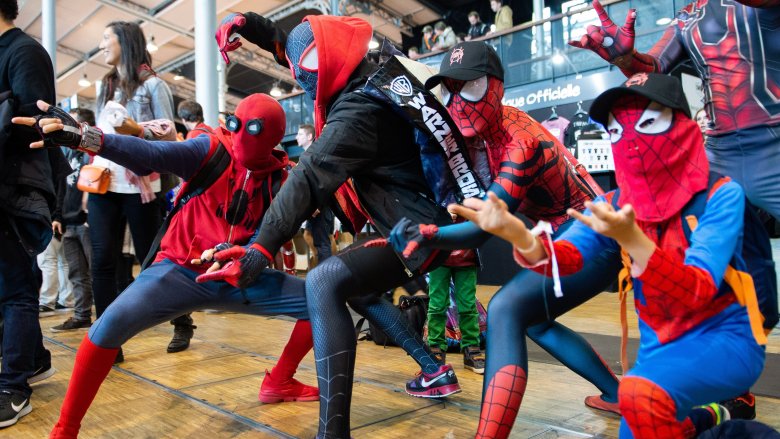Popular Characters That Will Soon Be Public Domain
For the past century of creative works, copyright has been king. Sure, anyone in the world can write a book or make a movie about ancient figures like Robin Hood, Hercules, Anansi, and King Arthur, but when it comes to any heroes, villains, or goofy mascots invented in the 20th century, they're off-limits. Want to do your own take on the Superman legend? Too bad, because DC Comics is going to sue you to ground. Trying to sell hand-knitted Mickey Mouse caps on Etsy? Oh man, get ready for Disney to drop a piano on your house, and not a cartoon one.
However, in the next decade or so, that's all about to change. The copyrights to a number of pop culture icons are due to expire, opening the floodgates for home cooked versions that anyone can create. Here are some of the most famous properties that will soon enter the public domain.
Mickey Mouse is about to meet a big public domain world
When it comes to understanding the history of U.S. copyright laws, everything centers around Mickey Mouse. Really.
According to the Art Law Journal, Mickey premiered in the 1928 cartoon Steamboat Willie. Under the laws of the time, Mickey's copyright should've expired in 1984, but when Disney expanded into a global superpower — and that little mouse dude became their mascot — the company got somewhat protective of him. So, in the late seventies, Disney lobbied congress to rewrite the copyright system, in order to hold onto the world-famous rodent a bit longer. Congress took the bait, extended the terms from 56 years to 75, and thus stretched Mickey's copyright protection to 2003. Disney then stayed quiet for a few decades, until 1998, whereupon the fight resumed. Soon afterward, congress once again acquiesced to the Mouse House, and agreed to extend copyright laws even further. Put simply, Mickey was put back in Disney's vault ... until 2023.
Now, if Disney wanted to lobby for another copyright extension, their deadline was 2019. Despite widespread expectations of a fight, according to Ars Technica, Disney did nothing. So, the day of January 1st, 2024 will see the monumental expiration of Steamboat Willie's copyright, finally freeing Mickey Mouse into the public domain. To be clear, though, this only refers to the original Mickey from Steamboat Willie. Any later additions to the character, even including minor details like his white gloves, will still belong to Disney ... for the time being.
Superman's rights are facing a new challenge
The Man of Steel might be a beacon for truth, justice, and the American way, but the historical struggle surrounding his creation is anything but. OK, except the American way bit. Back when Jerry Siegel and Joe Shuster first developed Superman in the thirties, they sold the rights to DC Comics for a whopping 130 bucks. Yikes. They sued the publisher in 1947, winning a settlement. A half-century later, their families sued DC again, alleging all these newfangled copyright laws should've given them more rights over the character. After years of courtroom drama, DC/Warner Brothers won.
Ironically, WB's victory will be short lived. According to the Hollywood Reporter, Superman will enter the public domain in 2033.
That said, the Supes who's going to go public that year won't be quite the same Supes you know. As WB's lawyers have keenly pointed out, when Superman first appeared in Action Comics #1, he didn't possess the power of flight, instead preferring to "leap tall buildings, in a single bound!," as you might've heard. Also, his chest was decorated by a rather bland yellow triangle with an S in it, rather than the stylized Kryptonian shield you know today. Meanwhile, since Lex Luthor didn't appear until 1940, Kal-El's archenemy would be off-limits to anyone wanting to get the jump on a non-DC Superman movie. In the end, though, if someone in 2035 produces a film about a non-flying Superman leaping across the country, there's presumably not much WB could do about it.
James Bond's number is coming up soon
Sit down, because 007's rights are complicated. Seriously, you're going to need a (shaken, not ... you know the drill) martini for this.
See, the difference between James Bond and a lot of these other characters is that Bond didn't premiere in a comic or big-budget movie, but rather, in a series of novels by his singular creator, Ian Fleming. Fleming died in 1964, according to PC Magazine — just a year after the release of the first Sean Connery movie, Dr. No — and so, in countries like Canada, Bond has already become a public domain character. Not so much in the United States, where the not-so-secret agent won't go public until 2034.
Now, to be clear: whether in Canada or the U.S., the only copyright expiring belongs to the literary James Bond, rather than the cinematic one. And hey, as book lovers and websites like the Daily Beast will tell you, Fleming's cold, murderous, rough-around-the-edges 007 was a far cry from the smooth-talking womanizer who went on to grace the silver screen. Basically, a lot more of a Daniel Craig than a Roger Moore. The point here is that any public domain Bond adaptations would be restricted to elements from Fleming's novels, and would have to carefully avoid anything derived from the films. For example, the classic gun barrel opening? Definitely not allowed.
Winnie the Pooh is a unique public domain case
Most Disney characters are either unique creations, à la Mickey and Donald, or have been loosely adapted (keyword: loosely) from fairy tales. Winnie the Pooh, though, is a special case, and not just for being so lovable. That's because the silly old bear, of that name, was actually a real stuffed animal owned by an equally real kid named Christopher Robin, whose father A.A. Milne wrote books about. To make matters even more confusing, Milne never actually gave the rights to Disney: rather, the Pooh copyright was purchased by comic book pioneer Stephen Slesinger, who himself then sold the Hundred Acre Woods to Disney in 1953. An argument over royalties led to a legal case in 1991, according to the Guardian, which lasted for 18 years. Disney won.
Now, Disney's Pooh material won't go into the public domain for a long time — they didn't start using him until 1966 — but the copyright to Milne's original novels will hit the hay in the near-ish future. As Nova Southeastern University explains, anyone will soon be able to reprint Milne's original books, make artwork, make their own Pooh cartoons, and so on, as long as they steer clear of any Disney fingerprints. Like what? Well, the Pooh in the books never wore a red t-shirt, for one, and Tigger hopped around on his feet, rather than his tail. Where copyright laws are concerned, these little things matter.
Conan the Barbarian is already public domain in Europe
In the United States, Conan the Barbarian is certainly not public domain. Marvel just recently reacquired the rights to print comic books about the Cimmerian warlord — which is only right, since they're the one who made Conan a big deal in the first place — and you'd be sued silly if you tried to make your own Conan film in California. Overseas in Europe, however? It's a different story entirely.
Since Conan creator Robert E. Howard died in 1936, according to Bleeding Cool, European copyright laws dictate that his work became public domain all the way back in 2006. That means any European company can produce their own Conan content, as long as it stays in Europe, as seen by the decision of French publisher Glénat to release their own 12-issue Conan the Barbarian comic book in 2018. On U.S. shores, such unlicensed Conan works won't be legal until 2031, thanks to the 1998 copyright extension law. Understanding these nuances is really important, unless you want to get slammed with something like the $21,000 copyright judgement that one artist received for trying to sell sculptures of Conan characters like Kull and Ironhand without a license, according to Courthouse News.
Soon, anybody will be able to make a Batman movie
Every decade seems to have its own Batman, whether its a goofball do-gooder like Adam West, a dark nutcase like Michael Keaton, or a tormented vigilante like Christian Bale. Soon, though, there might be more Batmen flapping around than anyone knows what to do with. As reported by Vox, the Dark Knight first landed onto the page in 1939, via Detective Comics #27, which means he'll follow Superman's footsteps in entering the public domain by 2034.
Now, while this does mean that anyone will be able to make their own Batman materials, it's once again important to understand the technicalities: early depictions of Batman portrayed the character as a gun-wielding murderer, à la the Punisher, who wasn't above hanging criminals from the Batplane or throwing them into acid tanks. Yikes! So a non-DC Batman movie that was released in 2034 could, for example, get in trouble by alluding to Batman's now iconic "no guns, no killing" rule, which didn't become part of the character until later on. You'd also have to skip out on the Joker, who didn't appear until 1940. Ditto for Batman's classic spiked gauntlets, since Comic Book Resources points out that Batman wore little purple gloves in his first appearance. Then there's the Batmobile, according to Trademark & Copyright Law, which in 2013 was ruled to be a copyrighted character unto itself.
The Looney Toons are breaking their shackles
Mickey Mouse isn't the only iconic cartoon animal that will be casting copyright law to the winds in the near future: according to Ars Technica, his biggest competitor, Bugs Bunny, will be right by his side. Over the course of the 2030s, Bugs will be joined by Daffy, Porky, Elmer Fudd, and the rest ... so if YouTube is still around by then, expect lots of weird videos to pop up. Once again, note that if Disney hadn't lobbied for those copyright extensions back in the nineties, all these classic Looney Toons characters would already be in the public domain today.
That said, given that the Warner Brothers lawyers are already revving their engines for a Superman fight, according to the Hollywood Reporter, you can bet your bottom dollar that anyone who starts putting out Bugs Bunny merch too quickly is going to have to be really, really careful: for example, the first appearance of a Bugs-like character — albeit, with Woody Woodpecker's laugh — was in the 1939 short "Porky's Hare Hunt," and CBS News says that the true Bugs didn't start munching carrots until 1940.
We're off to see the Wizard, in the wonderful world of public domain!
L. Frank Baum first published his novel The Wonderful Wizard of Oz all the way back in 1900, according to New Media Rights, so it's been in the public domain for quite some time. In that regard, it's rather surprising that there have been so few Oz adaptations out there, outside of the subversive Wicked, or the creepy 1985 semi-sequel. Most likely, it's because the Judy Garland film, The Wizard of Oz, is so deeply connected to the public's perception of the story that if a more faithful adaptation were released today — which, for example, would need to have Dorothy wearing Dutch-style silver shoes, instead of ruby red slippers — it would be accused of "changing" the story. Ironic, isn't it?
That said, the film didn't come out until 1939, which means the copyright has been tied up for almost a century. According to Vox, that will change in 2034, at which point the film (as well as ruby slippers, grayscale Kansas, and so on) will become public domain. The same year will also see the song "Over the Rainbow" hit the public domain, so you can expect to listen to hundreds more cover versions in the years to come.
The Shadow knows (that he's almost in the public domain)
Back before the Batman figured out that bad guys were a superstitious and cowardly lot, the classic pulp hero known as the Shadow struck fear in the hearts of evil men. The Shadow was, in many regards, a precursor to the modern superhero. He had a cool gimmick, a costume, super powers — he could turn invisible, to be precise — and even a secret identity, well before such things became cool. Though the character's notoriety largely stems from a radio program starring Orson Welles, the Shadow also starred in a 1931 pulp magazine. He later got adapted into a 1994 movie, starring Alec Baldwin, which tried to cash in on the pulpy fever surrounding Tim Burton's Batman flicks.
Since then, the Shadow has remained ... er, in the shadows. He's the super-grandpa who has totally missed out on the superhero boom, and for now, his rights are tied up with the publisher Condé Nast, according to DC Comics, who sometimes licenses the dark vigilante to other companies. That said, considering that the Shadow was up and running almost a decade before the DC superheroes came around, it's easy to deduce that he's going to be public domain in the near future. Maybe it's time for a new movie?
Public domain Wonder Woman, coming right up
Believe it or not, a lot of Wonder Woman's supporting cast, villains, and side characters are already in the public domain. As pointed out by Gizmodo, that's because her story is steeped in ancient Greek mythology, which is way too old to care about mundane mortal crap like copyrights. Seriously, you want to tell Zeus or Hippolyta that some film company owns their rights? Good luck.
Diana herself, though, is a DC creation, which means that Warner Brothers has kept her locked away from the public domain for almost a century. They're certainly happy about that, now that Gal Gadot's Wonder Woman has soared to the top of their superhero pantheon ... but they better make those sequels happen fast, because they're not going to be able to keep others from putting together their own Wonder Woman stories for too much longer. The Amazon warrior first hit the comic page in 1941, so she'll go public just a few years behind Superman and Batman.
The messy legal drama of Buck Rogers
The story of Buck Rogers' current legal woes is a prime example of how, even when a character hits the public domain, you still have to insanely careful about not stepping on anybody's toes. Seriously, these court cases will take up years of your life, even if you're a big name like Don Murphy, who produced hits like Transformers. In 2015, according to the Hollywood Reporter, Murphy first announced his intention to develop a film adaptation of a favorite book from his childhood, the 1929 novella Armageddon 2419 A.D., which first introduced Buck Rogers to the world. He presumed the novel had entered the public domain, so he didn't expect any issues. Sounds cool, right?
Unfortunately, this ignited a massive legal struggle. One of the big hangups, to give you a sense of how crazy this stuff gets, has been the name "Buck" Rogers: according to Geek, the character in the 1929 novel is actually referred to as "Anthony" Rogers, with the Buck nickname being a later addition. This effectively renders Anthony and Buck as two different characters, for legal purposes. Or does it? Whooo, courtroom dramas get messy!
Madeline, coming to the public domain in the 2030s
The French schoolgirl Madeline, a popular children's character first created by Austrian-born American writer Ludwig Bemelmans, was modeled after his mother, his wife, his daughter, and a bit of himself, according to the New York Times. Though Bemelmans rightfully predicted that Madeline, whom he wrote 12 books about, would one day be a massive success, he didn't live long enough to see how mainstream his character would become: when he died of cancer complications in 1962, his total trust was only valued at $200,000, according to Forbes. In the years since, the Madeline franchise has become a million-dollar business for his surviving family members.
While the family acknowledges that managing Madeline's legacy is a complicated process, it's going to get more complicated soon, particularly since the family has never registered a trademark for the character or her stories. By 2034, the copyright to Bemelmans' original Madeline books will expire, putting her into the public domain.
Bonus: all the Spider-Man legal drama (almost) could've been avoided
First off, calm down: Spidey's not going into the public domain anytime soon. The friendly neighborhood web-slinger first appeared in Amazing Fantasy #15, in 1962, and if current laws remain unchanged, his copyright won't expire until the 2050s. Here's the funny thing, though. As pointed out by Screen Rant, right in the wake of Sony Pictures and Disney wrestling over whether or not to keep Tom Holland's Spidey in the MCU, the true party to blame for Disney's inability to use Peter Parker as they see fit is ... well, Disney itself.
How so? Because, don't forget, it was Disney who lobbied congress to extend copyright laws in both the seventies and nineties. If the House of Mouse hadn't pushed for copyright extensions, then Spider-Man's copyright would have expired on — bizarrely enough — January 1st, 2019, the exact same year that the infamous Sony/Disney tug of war began. Crazy, right? So, in the end, it seems like Spidey's true archenemy ended up being not Doctor Octopus, Venom, or the Green Goblin, but rather, Mickey Mouse. Sad story, but if Spidey were here, he'd probably make a clever quip about it.
